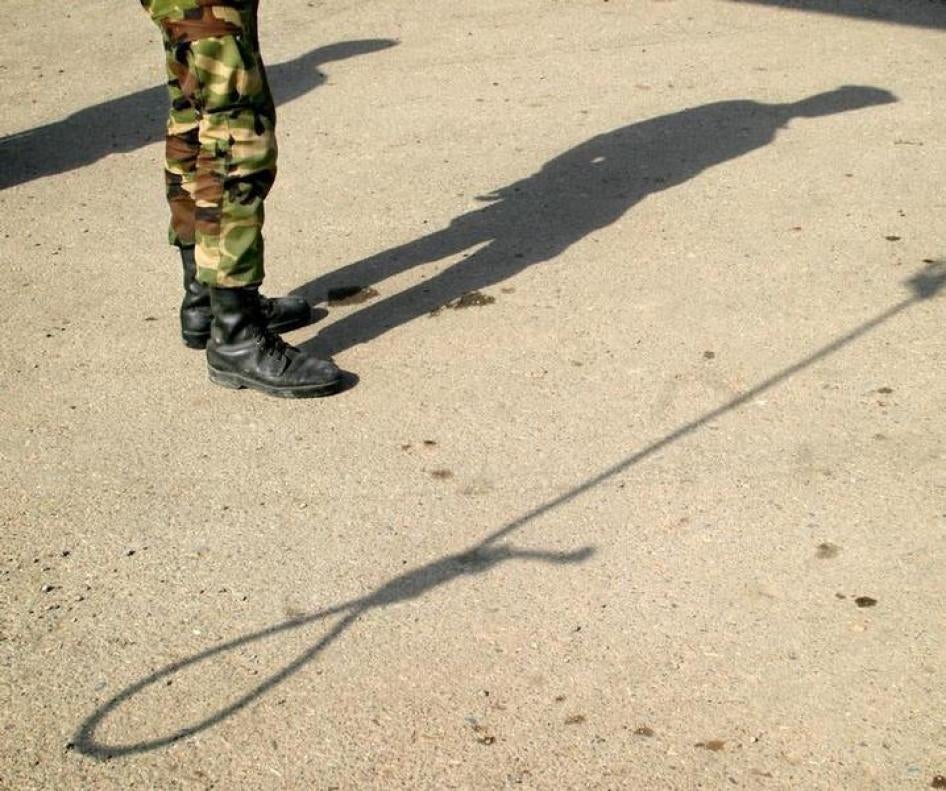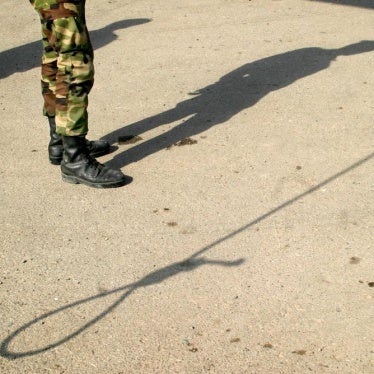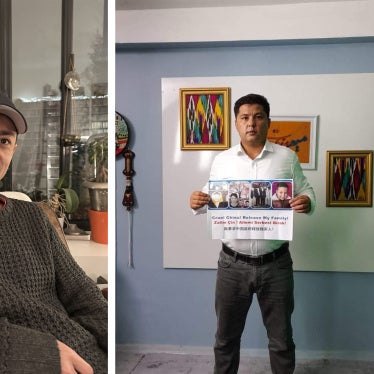(Beirut) – Iranian authorities are carrying out a horrific execution spree, with at least 113 reported executions in the first 25 days of May 2025 alone, Human Rights Watch said today. The international community should urgently press Iran’s authorities to halt all executions, including those of several political prisoners who are at imminent risk.
According to Iran Human Rights, an Oslo-based nongovernmental organization, as of May 27, Iranian authorities had executed 478 people in 2025. The organization reported a 75 percent increase in executions in the first four months of 2025 compared with the same period in 2024. If this deadly trend continues, over 1,000 people, including ethnic minorities, political dissidents, and individuals accused of drug-related offenses will be executed before the end of the year. Reported figures also show an escalation in the use of the death penalty against women and a disproportionate impact on marginalized communities, including oppressed ethnic minorities. The 110 people reported to have been executed in April included three women, four Afghan nationals, 36 Baluch people, six Kurdish prisoners, an Ahwazi Arab, and a Turkmen.
“Iran’s authorities have executed at least three people a day on average during the first five months of 2025, with more dissidents and marginalized communities falling victim to the government’s vicious repression of dissent and brutal anti-drug policy,” said Federico Borello, interim executive director of Human Rights Watch. “The killing spree shows no signs of slowing down and the scale of the crisis underscores an urgent need for the international community to press the Iranian government to immediately halt all executions and establish a death penalty moratorium.”
Iran’s authorities weaponize the death penalty to instill fear in the population and stifle opposition, targeting members of persecuted ethnic minorities, political dissidents, and women. Several people accused of national security offenses are feared to be at imminent risk of execution. Among them are Pedram Madani, 40, Mehdi Hassani, 48, and Behrouz Ehsani Eslamlou, 69, political prisoners on death row in Ghezel Hesar Prison, in Alborz province.
Human Rights Watch has received information that Madani, sentenced to death on the vaguely worded charge of “corruption on earth,” was transferred out of Evin Prison in Tehran to Ghezel Hasar on May 25, in preparation for his execution, which may be as soon as May 28. Authorities arrested Madani in 2019 for allegedly spying for Israel, and a Revolutionary Court subsequently sentenced him to death. His sentence was overturned by the Supreme Court three times, according to Iran Human Rights, but he has been sentenced to death for a fourth time upon retrial by a lower court. His family was summoned for a last visit, meaning he may be executed within days.
Human Rights Watch obtained information that in May 2025 Iran’s Supreme Court rejected for the third time Hassani’s and Eslamlou’s requests for a judicial review of their case, raising fears that their execution could be implemented at any time. The men have been on death row since September 2024, when Branch 26 of Tehran’s Revolutionary Court sentenced them to death on vaguely worded and broadly defined charges, including “armed rebellion,” “enmity against God,” and “corruption on earth” in connection with allegation of affiliation with the People's Mojahedin Organization of Iran, an outlawed opposition group.
Trials before Iran’s revolutionary courts systematically fail to adhere to fair trial and due process guarantees, Human Rights Watch said. An informed source told Human Rights Watch that Hassani was held in solitary confinement for six months after his arrest in September 2022 and was subjected to torture and other ill-treatment. He and Eslamlou were sentenced after a summary trial that lasted only several minutes.
At least two other men were sentenced to death on politically motivated charges in May. On May 10, the Association for the Defense of Azerbaijani Political Prisoners in Iran reported that Branch 3 of the Revolutionary Court in Tabriz, East Azerbaijan province, had sentenced Ehsan Faridi, a 22-year-old Azerbaijani student at the University of Tabriz, to death on the vaguely worded charge of “corruption on earth.” His case now awaits review by the Supreme Court. Authorities arrested Faridi on June 18, 2024, and transferred him to Tabriz Central Prison. Faridi had previously been detained for a month in March 2024, and sentenced to six months in prison for “propaganda against the state.”
The Human Rights Activists News Agency (HRANA) reported that on May 1, Branch 1 of the Revolutionary Court in Rasht sentenced to death Peyman Farah Avar, a poet and political prisoner held at Lakan’s prison in Rasht, Gilan province, on the vaguely worded charges of “armed rebellion” and “enmity against God.” A source close to the family told HRANA that the charges stem from his poetry and activism related to social justice and civil rights. The court convicted him after proceedings that failed to adhere to due process and fair trial guarantees. His court session was held behind closed doors, without the presence of his chosen lawyer.
Fears for political dissidents at risk of execution are heightened following the April 21 execution of Hamid Hosseinnejad Haydaranlu, a 40-year-old Kurdish prisoner, convicted on charges of “armed rebellion” for alleged membership in the Kurdistan Workers' Party and involvement in an operation that resulted in the alleged killing of eight security force members. According to the nongovernmental Kurdistan Human Rights Network, the authorities subjected him to torture to extract confessions and dismissed exculpatory evidence that showed he was not in the country at the time of the alleged offense.
The Iranian authorities’ disregard for the right to life disproportionately affects oppressed ethnic minorities and impoverished communities. According to Iran Human Rights, over half of the people executed in April were charged with drug-related offenses, while more than 30 percent were Baluch, Kurdish, Turkmen, and Arab people. The country’s lethal anti-narcotics policy further deepens the poverty and injustice faced by the most marginalized communities, many of whom are from ethnic minorities or undocumented Afghan nationals.
Under international human rights law, the death penalty should only be imposed for the “most serious crimes,” which are restricted to crimes involving “intentional killing,” and only then in exceptional circumstances. It explicitly excludes drug-related and political offenses from such punishment. Any deprivation of life, including through judicial executions, that contravenes international law is arbitrary and unlawful in nature. Referring to structural flaws in Iran’s laws and patterns of rights violations in death penalty cases, the United Nations special rapporteur on Iran concluded that “most, if not all, executions [in Iran] are an arbitrary deprivation of life.” Human Rights Watch opposes the death penalty for all offenses and in all circumstances and calls for its abolition globally.
Since January 2024, death row prisoners in Iran have gone on hunger strike every Tuesday as part of what has become known as the “No to Execution Tuesdays” campaign to protest the wave of executions and to publicly plead for international intervention. Many human rights defenders, including Nobel Peace Prize laureate Narges Mohammadi, have supported the campaign including by going on solidarity hunger strikes.
“Death row prisoners in Iran are regularly going on hunger strike for their lives and those of their fellow death row inmates,” Borello said. “The international community should stand up for their human dignity and show solidarity with their courageous resistance to the Iranian authorities’ relentless assault on the right to life.”








